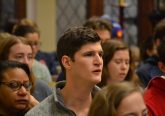Gentle revolution: Pope wants Year of Mercy to tenderly transform world

IMAGE: CNS photo/Ettore Ferrari, EPA
By Junno Arocho Esteves
VATICAN CITY (CNS) — When Pope Francis planned the Year of Mercy and the opening of the Holy Door, he did not mean to give the starting signal for a frenzied wave of pilgrims to Rome.
More than call to sign up for an Eternal City package tour, the pope is inviting people to strike out on a yearlong spiritual journey to recognize a loving God who’s already knocking on their door.
He says he wants the Year of Mercy to usher in a “revolution of tenderness.”
Once people realize “I’m wretched, but God loves me the way I am,” then “I, too, have to love others the same way,” the pope said in an interview published just a few days before the Dec. 8 start of the jubilee year.
Discovering God’s generous love kick-starts a virtuous circle, which “leads us to acting in a way that’s more tolerant, patient, tender” and just, he said.
Speaking with “Credere,” an Italian weekly magazine run by the Pauline Fathers, the pope gave an in-depth look at why he sees such an urgent need to highlight God’s mercy.
“The world needs to discover that God is father, that there is mercy, that cruelty is not the path, that condemnation is not the path,” he said. “Because the church herself sometimes follows a hard line, she falls into the temptation of following a hard line, into the temptation of underlining only moral norms, but so many people remain on the outside,” he said.
The pope said the thought of all those people — sinners, the doubtful, the wounded and disenfranchised — conjured up that iconic image of seeing the church “as a field hospital after the battle.”
“The wounded are to be treated, helped to heal, not subjected to cholesterol tests,” he said, meaning a too narrow scrutiny of minutiae delays staving off the broader disease of conflict and indifference. He once illustrated the same concept by painting a visual image of pastors who prefer to coif and comb the wool of the tiny flock in the pews rather than seek the sheep that are outside in danger or lost.
“I believe this is the time for mercy. We are all sinners, we all carry burdens within us. I felt Jesus wants to open the door of his heart,” he said in the magazine interview.
The opening of the holy doors in Rome and around the world will be a symbol of how Jesus is opening the door of his heart.
In fact, dioceses have been asked to designate and open their own “Door of Mercy” in a cathedral, an important church or sanctuary. The pope also will send out from Rome “missionaries of mercy” — priests mandated to the world’s peripheries to show patience and compassion in their ministry.
Such gestures suggest the pope still wants people to avoid the expense of travel — like his post-election suggestion to fans back home in Argentina to give to the poor the money they would have spent for a trip.
To help people at home feel “just like being there” in Rome, the Vatican television center will start broadcasting major papal events during the Holy Year in latest generation “Ultra HD 4K” resolution as well as HD, 3D and standard definition.
With the appropriate displays or TVs, people will be able to watch events with increased depth and detail, and, for the opening of the Holy Door in St. Peter’s Basilica Dec. 8, 19 cameras were to be deployed to capture every angle, including a unique papal point of view.
The Vatican also planned to set up 4K screens in a prison in Milan, a hospital in Rome and possibly in the Holy Land so people who are physically confined could feel part of the opening ceremony.
From the very start of his pontificate, Pope Francis has been showing what the way of mercy means.
The pope’s very first Angelus address and homily in 2013 centered on mercy, as he explained God always waits for that day of awakening and conversion, then forgives everything. The real problem is people — not God — who give up on forgiveness, he said.
But mercy changes everything, he said; it “makes the world a little less cold and more just.”
The pope’s own religious vocation is rooted in that concrete experience of mercy, when he — as a 17-year-old student — walked out of a confessional “different, changed.” It was the feast of St. Matthew, and like St. Matthew, he was overcome, feeling “God looked at me with mercy” and said, “Follow me.”
Realizing God knows he’s a sinner, but embraces him anyway lies at the heart of Pope Francis’ ministry and his motto: “By showing mercy, by choosing,” based on “The Call of St. Matthew.”
He said in the magazine interview that one Friday of every month during the Year of Mercy “I will make a different gesture” that shows God’s mercy. He had asked the world’s young people to rediscover the corporal and spiritual works of mercy, like feeding the hungry and counsel the doubtful, and choose one to practice each month as they prepare for World Youth Day in July.
The “Credere” interview reveals that the pope has been championing a more merciful church for decades.
In a small group discussion during the 1994 ordinary Synod of Bishops on consecrated life and its role in the church and the world, then then-Auxiliary Bishop Jorge Mario Bergoglio of Buenos Aires, Argentina, he said it was necessary “to institute a revolution of tenderness,” to which one synod father countered, “with reasonable explanations,” how “it wasn’t good to use this kind of language.”
But now two decades later as leader of the universal church, the opening of the Year of Mercy may be his moment to set that revolution into motion.
– – –
Copyright © 2016 Catholic News Service/U.S. Conference of Catholic Bishops. www.catholicnews.com. All rights reserved. Republishing or redistributing of CNS content, including by framing or similar means without prior permission, is prohibited. You may link to stories on our public site. This copy is for your personal, non-commercial use only. To request permission for republishing or redistributing of CNS content, please contact permissions at [email protected].


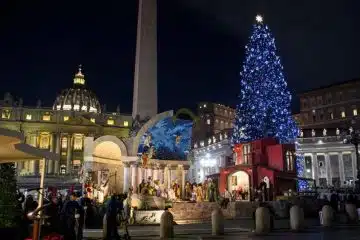
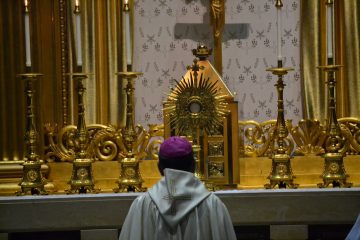

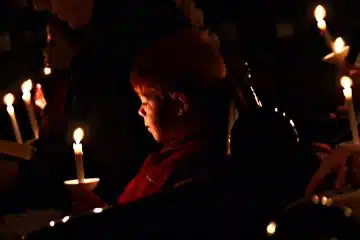

![The night is advanced, the day is at hand. Let us then throw off the works of darkness [and] put on the armor of light Romans 13:12 Rorate Mass Old St Mary (CT Photo/Greg Hartman)](https://www.thecatholictelegraph.com/wp-content/uploads/2018/12/DSC_0569a-360x240.jpg)
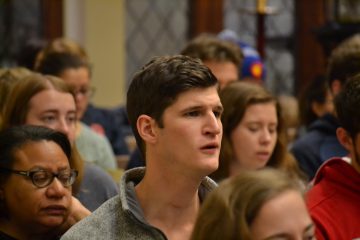
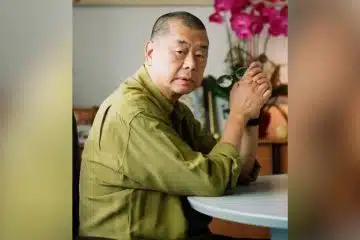
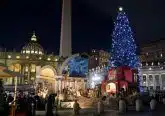

![The night is advanced, the day is at hand. Let us then throw off the works of darkness [and] put on the armor of light Romans 13:12 Rorate Mass Old St Mary (CT Photo/Greg Hartman)](https://www.thecatholictelegraph.com/wp-content/uploads/2018/12/DSC_0569a-165x116.jpg)
